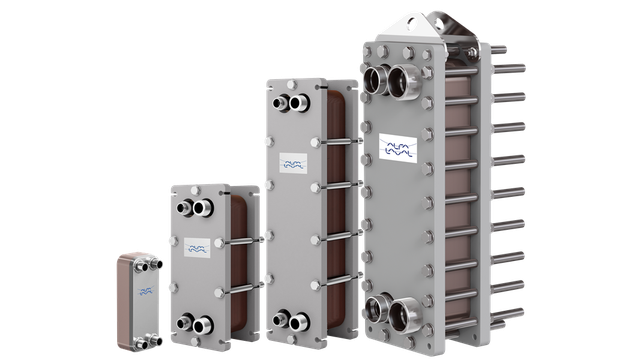AXP
Alfa Laval AXP X-treme pressure line is specifically developed to work in air conditioning, CO₂ and other refrigerant applications, where the pressure requirements are extremely high.
The capacity range stretches from 2 to 300 kW and maximum PED approval pressure of 167 bar at 90° C and maximum UL approval of 2233 psi at 400° F. The Alfa Laval AXP X-treme pressure line is suitable to cover heat recovery duties, gas cooling, condensing, sub-cooling and suction gas heating.
Applications
- CO₂ hot water heat pumps
- CO₂ supermarket chiller installations
- Commercial air conditioning systems
Alfa Laval AXP X-treme pressure line is specifically designed for R744/CO₂ as refrigerant in subcritical and transcritical applications, but can also be used for other fluids requiring high pressures.
Features and benefits
- Compact, durable designs with consistently high quality; ease of installation
- Withstands high pressures up to 167 bar and 2233 psi
- Extensive range of high pressure models providing cooling capacities from 2 to 300 kW
- Cost efficient: space savings due to the compact design of brazed plate heat exchangers compared to shell-and-tube heat exchangers
- Rapid response to temperature changes due to small hold-up volume and lower refrigerant charge
- Optimized design for every duty with customized brazed plate heat exchanger configuration to customer’s own specifications
- Widely recognized pressure vessel codes available as standard
- Every brazed plate heat exchanger is pressure and leak tested before delivery, ensuring top quality products
Come funziona:

Material
In brazed plate heat exchangers, the surfaces used to provide heat transfer from one medium to the other are thin, corrugated AISI 316 stainless steel plates stacked on top of each other. The two media are sealed within the plate pack by a brazed copper seal around the edge of the plates. This results in a heat exchanger that – unlike traditional designs – consists solely of surfaces which actively contribute to heat transfer, resulting in significant increases in overall efficiency.
Design
The channels formed between the plates and corner ports are arranged so that the media flow through alternate channels – always in a counter-current flow pattern in order to achieve the most efficient heat transfer.
The contact points between the plates are also brazed, helping to withstand the effects of high pressures and high temperatures. Pressure peaks and rapid temperature cause substantial physical stresses within the materials, and Alfa Laval research has focused on the details of these phenomena in order to ensure designs that are extremely resilient and provide a long service life.

